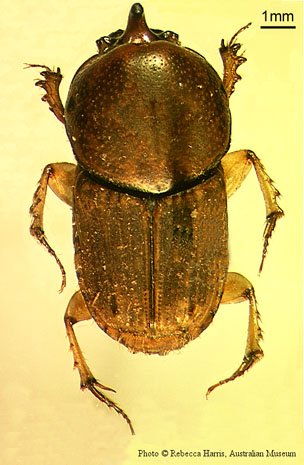![]()
![]()
![]()
Genus Euoniticellus
 Species found in eastern New South Wales: 3 introduced species, E. africanus, E. fulvus, E. intermedius.
Species found in eastern New South Wales: 3 introduced species, E. africanus, E. fulvus, E. intermedius.
Other species: E. pallipes (south-western NSW).
Distribution
Eastern Africa, from Ethiopa to South Africa; Central and Southern Europe, Asia Minor, Turkistan, Iran, Afghanistan and India.
Description
Medium (7-13mm). Light to dark brown. Elongate, dorsally convex, parallel-sided.
Clypeal margin with either 0 or 2 teeth, and 2 teeth at junction of frons and clypeus. Anterior part of underside of pronotum not excavated anteriorly. Some species with keels and tubercles on head. Elytra with 8 striae. Striae faintly impressed, impunctate to moderately punctate. Intervals slightly convex. Epipleuron narrow, with small excavation on ventral margin below humerus. Dorsal surface with short bristles, and a line of longer setae along posterior margin.
Hind wings: Fully developed.
Legs: Fore tibiae with 4 teeth (4th small) on the outer edge. Middle coxae parallel. Mid and hind tibiae with transverse ridges. Middle tibiae with 2 strong spurs of unequal length. Spurs on hind tibiae longer than 1st tarsal segment. 1st segment of hind tarsus as long as segments 2-4 combined. Claws simple.
Abdomen: Sternites normal. Pygidium without grooves or depressions.
Sexual dimorphism
Female: Teeth on fore tibiae generally smaller and rounder. Frontoclypeal ridges and tubercles different. In one species, E. intermedius, head armament differs between male and female.
Similar Genera
Liatongus, of a similar size and general shape, yellow brown colour.
Obvious differences: Liatongus, elytra with distinct longitudinal yellow stripes, no line of setae along posterior margin; head armament in males of E. intermedius.
Ecology
Adults coprophagous, winged, in open areas, pastures, mainly found in cow dung.
References
Cassis, G. & Weir, T.A. (1992) Scarabaeinae. pp 106-173. In: Houston, W.W.K. (ed.) Zoological Catalogue of Australia. Coleoptera: Scarabaeoidea. Canberra: AGPS Vol. 9.
Tyndale-Biscoe, M. (1990) Common Dung Beetles in Pastures of South-eastern Australia. CSIRO Division of Entomology.
